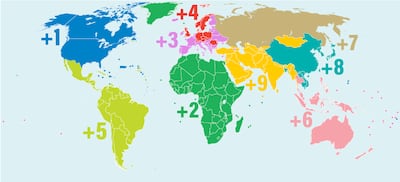Quiz question. When were the Emirates first unified as one new country?
If you answered December 2, 1971, then try again. The correct answer is a few years earlier - at least if you were calling on the telephone.
The year 1968 is when the country was awarded the now familiar 971 international dialling code. As far as the rest of the world was concerned, Abu Dhabi, Dubai, Sharjah and the Northern Emirates were all united.
But who decided to make this declaration of unity? And why the seemingly random three digit number, 971?
The answers to both questions lie with the International Telecommunications Union, the most important global organisation you have probably never heard of.

The ITU was created in 1865 to help the standardisation of the new telegraphs, which were revolutionising international communications.
In 1945, it became part of the United Nations, making it the oldest UN agency, with the slogan “Committed to connecting the world.”
These days its responsibilities include things such as satellites, mobile phone networks and the internet, but in the late 1950s developing a system for international phone calls was the main concern.
In June 1964 hundreds of delegates met in Geneva to agree on how this could be done. The world was divided into nine regions and each assigned a number as a dialling code.
The US and Canada were given 1, Europe the numbers 3 and 4, Africa 2 and so on.
Asia was divided in two. China and Japan got the number 8, and the rest, a huge area stretching from Turkey to Myanmar, which was Burma at the time, was given 9.
Each country was then given further identifying numbers. The bigger countries were awarded two digits, and the small ones three.

So the UK has the dialling code 44 and France 33. Brazil is 55 and Turkey is 90. Smaller counties are given a third digit in numerical order. Lebanon is 961, Jordan 962, Syria 963, all the way to 968, which is Oman. At the time Yemen was divided between north and south, and so once had two codes, 969 and 967.
More dialling codes were assigned at another meeting of the ITU at Mar del Plata in Argentina in October 1968. At the time the UAE was then known as the Trucial States, whose foreign relations were controlled by Britain.
At the meeting, the Trucial States were represented by a branch of the British foreign office, and assigned the next free international dialling code, which was 971.
It seems probable that politics also played a part in the decision-making process. By the summer of 1968, Sheikh Zayed and Sheikh Rashid had already agreed to form the UAE, and the dialling code would have anticipated this.
Likewise, the code 970 was reserved for a future Palestinian state and is now used by the Palestinian Authority. Previously, callers had use to the 972 code of Israel. In the rest of the Gulf, Bahrain was given 973 and Qatar 974.
Between 1976 and 1979, the ITU also created additional codes for Dubai and Abu Dhabi, using 978 and 979, but deleted them in 1980.
So much for international numbers. What of the local dialling codes in the UAE? The agency responsible is the Telecommunications and Digital Government Regulatory Authority, and before that the Emirates Telecommunications Group, known as Etisalat.
Local phone numbers in the UAE are identified by emirate. Abu Dhabi is 02, Al Ain 03, Dubai 04, Ras Al Khaimah 07 and Fujairah 09. Sharjah, Ajman and Umm al Quwain share 06. Mobile numbers begin with 05 and toll-free numbers are 0800.
What about the number 1? The original constitution contained a clause which specified that “the capital city of the UAE shall be established in an area granted by Abu Dhabi and Dubai emirates on the borders between them, which shall be called Karama, or dignity”.
In the end, the city was never built, and Abu Dhabi was declared the official capital in 1996. But the dialling code assigned to Karama, with numbers beginning 01, still survives as its legacy.
A version of this article was first published on August 23, 2022







